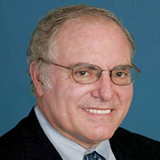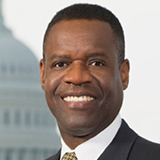Speakers

David A. Abel
David A. Abel is a managing director at the Chicago offices of William Blair & Company LLC, where he focuses on large issuers, tax-exemption analysis, and pricing transparency. A public finance practitioner with twenty-five years of experience, Abel has held various quantitative specialist and senior management positions at UBS Financial Services, First Chicago Capital Markets/Bank One, and George K. Baum and Company. Before joining William Blair & Company in 2007, he spent four years in the public sector as the Director of Debt Management for the State of Illinois. Abel earned a B.S. in economics from the University of Colorado at Boulder.
top of page

Manuel Adelino
Manuel Adelino is an assistant professor of finance at the Fuqua School of Business at Duke University. He conducts research on corporate finance, financial intermediation and entrepreneurial finance. Adelino's current work focuses on the effects of municipal bond ratings on employment and the effects of financing constraints on new business creation. He was a business analyst in the Lisbon office of McKinsey before pursing his doctorate. Adelino has a Licenciatura in business administration from the Universidade Católica Portuguesa and a Ph.D. in financial economics from the Sloan School of Management at the Massachusetts Institute of Technology.
top of page

Jennie Bai
Jennie Bai is an assistant professor of finance at Georgetown University. Her research focuses on credit risk and liquidity risk in the fixed-income market and financial institutions. She also works on asset pricing in the art market. Her interest in art also extends to having served as a member of the Asian Arts Council at the Art Institute of Chicago, and serving as a docent as the Field Museum and at the Metropolitan Museum of Art. Before joining Georgetown University, Bai worked as an economist at the Federal Reserve Bank of New York between 2008 and 2013. She has a B.S. from Fudan University, and an M.B.A. and a Ph.D. from the Booth School of Business at the University of Chicago.
top of page

Daniel Bergstresser
Daniel Bergstresser is an associate professor of finance at Brandeis University, which he joined in 2012 after visiting the previous academic year. Bergstresser specializes in municipal finance and the impact that taxation, regulation, and market structure have on financial markets. In 2006 and 2007 he worked in London as the head of European Credit Research for Barclays Global Investors while on leave from Harvard Business School. Bergstresser has an A.B. in economics from Stanford Univerity and a Ph.D. in economics from the Massachusetts Institute of Technology.
top of page

Timothy J. Coffin
Timothy J. Coffin is a senior vice president at Breckinridge Capital Advisors, where he focuses on value-based fixed income investment strategies for institutional investors. Before joining Breckenridge in May 2007, Coffin was a vice president at Fidelity Capital Markets, where he launched and managed the firm's Municipal Finance Group. Prior to his time at Fidelity, Coffin spent 10 years with Corby Capital Markets, where he managed sales and marketing for seven years before serving as the firm's president. He began his career in fixed income investment as an institutional salesman with both Donaldson, Lufkin & Jenrette and RBC Dain Rauscher. Coffin has served as governor of the Municipal Bond Club of Boston. He received a B.A. from Hobart College.
top of page

Michael Decker
Michael Decker currently serves as managing director and co-head of municipal securities at the Securities Industry and Financial Markets Association (SIFMA), a position he has held since October 2009. In this role, Decker oversees many of the Association's initiatives regarding municipal bonds and related products. Before joining SIFMA, Decker was the founder and the chief executive officer of the Regional Bond Dealers Association (RBDA), now known as the Bond Dealers of America. Decker was responsible for representing the interests of RBDA's members before federal legislative and regulatory bodies and managing a wide variety of RBDA functions and services. Prior to his tenure at RBDA, Decker was the senior managing director for research and public policy for SIFMA and its predecessor organization, the Bond Market Association, and oversaw SIFMA's research activities. These included analyzing industry and market trends, collecting market and industry data, and publishing research reports covering all aspects of the global securities markets. Decker also directed public policy development and analysis. He has also worked as a financial consultant to the U.S. Agency for International Development. Decker has a B.A. in political science and chemistry from the University of North Carolina at Chapel Hill, and an M.P.M. with a concentration on public finance from the University of Maryland School of Public Policy.
top of page

Robert A. Fippinger
Robert A. Fippinger is the chief legal officer of the Municipal Securities Rulemaking Board (MSRB), where he oversees all legal and external affairs. He is also a senior counsel at Orrick, Herrington & Sutcliffe, which has a large practice in the area of public finance. Prior to his current positions, Fippinger was a partner at Orrick, Herrington & Sutcliffe and a partner and associate at Hawkins, Delafield & Wood. Fippinger is the author of a two-volume treatise, The Securities Law of Public Finance, and has taught public finance and securities law at Yale Law School, New York University School of Law, and at Hofstra University's law school, now known as the Maurice A. Deane School of Law. Fippinger is active in the arts community—he has served as the chairman of the board of the American Symphony Orchestra, the president of the board of the Maine Center for Furniture Craftsmanship, a member of the Collections Committee at the Museum of Art and Design, and a member of the William Cullen Bryant Committee for American Art at the Metropolitan Museum of Art. Fippinger has a bachelor's degree from Duke University, earned a master's and a doctoral degree from Northwestern University, and received a law degree from the University of Michigan Law School.
top of page

Philip J. Fischer
Philip J. Fischer leads Municipals and Indices Research at Bank of America Merrill Lynch Global Research. He has been recognized by both Smith's Research and Institutional Investor as an all-star municipal strategist and wrote Investing in Municipal Bonds (2013, McGraw-Hill). Before his current position, Fischer spent three years at eBooleant Consulting and also served as a director for Banc America Preferred Funding Corporation. Earlier in his career he was the manager of municipal strategies at Merrill Lynch and worked at Salomon Brothers and Citicorp Investment Bank. Fischer has taught at the University of Oregon (finance and business law) and SUNY Albany (finance, investments, and economics). He has a bachelor's degree from Oregon State University, a J.D. from Loyola School of Law, and an M.B.A. (finance) and a Ph.D. from the University of Oregon.
top of page

George Friedlander
George Friedlander is a managing director at Citigroup Investment Research and Analysis, where he heads the group for Municipal Macro Strategy and Policy. In 2011 Institutional Investor ranked Friedlander and his team as #1 in Municipal Market Strategy and #2 in 2012, 2013, and 2014. He was ranked #1 in 2014 by two other polls that specifically target the muni investor universe. Friedlander chairs the Technical Advisory Committee of the Municipal Bonds for America Coalition. He was on the Securities Industry Financial Market Association's Municipal Executive Committee for 25 years, and since 2010 has been an associate member. Friedlander is currently working with state and local public interest groups on ways to respond to potential threats to the tax-exempt status of municipal bonds. He earned a B.S. in math from the State University of New York at Stony Brook and an M.B.A. from Pace University.
top of page

William Glasgall
William Glasgall is the program and editorial director for the State and Local Accountability and Improvement programs at The Volcker Alliance in New York. There he leads the project on Truth and Integrity in State Budgeting and Financial Reporting, which issued its initial report in June 2015.This report builds on recommendations made in 2013 by the State Budget Crisis Task Force headed by Paul Volcker and former New York Lieutenant Governor Richard Ravitch. Glasgall is also senior adviser to the Ravitch Fiscal Reporting Program at the CUNY Graduate School of Journalism in New York. A financial journalist with over four decades of experience, Glasgall came to the Alliance from Bloomberg News, where as Managing Editor for States and Municipalities he directed its award-winning U.S. local-government coverage. Before joining Bloomberg, Glasgall spent almost 20 years at BusinessWeek as senior writer and senior editor, winning two Overseas Press Club prizes for international reporting and heading the magazine's personal finance and lifestyle sections. He is a graduate of Boston University.
top of page

Matthew Glasser
Matthew Glasser is an adjunct professor of law at American University's Washington College of Law, where he teaches about international development finance, drawing on over 35 years of experience in urban law and municipal finance. From 2003 through 2014 Glasser was the lead urban specialist at the World Bank, working primarily in sub-Saharan Africa and south Asia. Between 2000 and 2003 he was at the National Treasury of South Africa, where he helped develop policies and legislation that successfully revived South Africa's municipal credit market. Glasser managed urban programs in central and eastern Europe on behalf of USAID from 1992 to 2000. For two years, he was a resident adviser to Ukraine on municipal finance and reform of municipal utilities. Glasser started his career as a municipal bond attorney with the Denver firm of Tallmadge, Tallmadge, Wallace & Hahn, then served as the city attorney for Broomfield, Colorado. He earned a B.A. in political science and an M.B.A. from the University of Colorado and a J.D. from Cornell University Law School.
top of page

Tracy Gordon
Tracy Gordon is a senior fellow at the Urban-Brookings Tax Policy Center, where her research focuses on the fiscal challenges facing state and local governments. Before joining the Urban Institute, Gordon served as a senior economist on White House Council of Economic Advisers. She has also served on the District of Columbia Tax Revision Commission, and was an economic studies fellow at the Brookings Institution, an assistant professor at the Maryland School of Public Policy, and a fellow at the Public Policy Institute of California. Her recent publications include "The Federal Stimulus Programs and Their Effects" (with Gary Burtless), published in The Great Recession (2011, Russell Sage) and entries in two Oxford Handbooks, "State and Local Fiscal Institutions in Recession and Recovery" and "Addressing Local Fiscal Disparities." Gordon has a B.A. in human biology from Stanford University, an M.A. in economics, and and a Ph.D. in public policy, all from the University of California at Berkeley.
top of page

Angela K. Gore
Angela K. Gore is an associate professor and chair of the department of accounting at the George Washington University's School of Business. She is also a research affiliate with the George Washington Institute of Public Policy. Gore's academic work focuses on how accounting, economics, finance, and public policy intersect in corporate and governmental settings. Her recent research examines the relationship between public sector unions and accounting transparency, public sector manager severance packages, and disclosure transparency in the municipal bond market. Gore is the 2010 recipient of the AAA/Deloitte Wildman medal for the most significant contribution to accounting practice. She has a B.S. in business administration from Central Michigan University and a Ph.D. in management from the State University of New York at Buffalo.
top of page

Pab Jotikasthira
Chotibhak (Pab) Jotikasthira is an assistant professor of finance at the Kenan-Flagler Business School at the University of North Carolina at Chapel Hill. His research interests include financial intermediation, international finance, fixed income, and the trading behaviors of institutional investors and their impact on asset prices. Jotikasthira has written extensively on the effects of institutional frictions, including regulatory capital and accounting rules, on financial intermediaries' investment and trading incentives, which in turn shape the overall risk and interconnectedness of asset markets. Prior to starting his doctoral coursework, he worked as a portfolio and risk manager for the Bank of Thailand, where he managed $38 billion in foreign-exchange reserves invested in global fixed-income markets and developed quantitative models for formulating investment strategies. Jotikasthiri has B.S. in engineering from Chulalongkorn University in Bangkok, an M.B.A. from Duke University, and a Ph.D. in finance from Indiana University-Bloomington.
top of page

Andrew Kalotay
Andrew Kalotay is an authority on the valuation and management of municipal bonds. His contributions to the literature range from optimizing the timing of advance refunding to tax-neutral valuation and dynamic tax management. He was inducted into the Fixed Income Analyst Society's "Hall of Fame" in 1997. In 1990 he left Salomon Brothers to establish Andrew Kalotay Associates, which licenses fixed income software and provides debt management advisory services. Prior to Wall Street, he was at Bell Laboratories and AT&T. On the academic side, he was the founding director of the graduate financial engineering program at Polytechnic University (now part of NYU). Kalotay holds a B.Sc. and an M.Sc. from Queen's University and a Ph.D. from the University of Toronto, all in mathematics.
top of page

Jessica Kane
Jessica Kane works at the U.S. Securities and Exchange Commission (SEC), where she serves as the Director of the Office of Municipal Securities (OMS). This Office is responsible for coordinating the SEC's municipal securities activities, advising the Commission on policy matters relating to the municipal securities market, and providing technical assistance in the development and implementation of major SEC initiatives in the municipal securities market. Kane has been actively involved in developing recommendations to the SEC for the final rules regarding municipal advisor registration and then implementing these final rules. The latter task includes developing staff interpretive guidance and reviewing rules for municipal advisor regulation proposed by the Municipal Securities Rulemaking Board. Before her current position at the OMS, Kane worked in the SEC's Division of Corporation Finance and its Office of Legislative and Intergovernmental Affairs. Kane holds a bachelor's degree from Georgetown University and a law degree from George Mason University School of Law.
top of page

Sharon N. Kioko
Sharon N. Kioko is an associate professor of public administration at the Daniel J. Evans School of Public Affairs at University of Washington. Her research focuses on the financial condition of state and local governments, the relevance and significance of financial information in the municipal securities market, and the impact fiscal rules and limitations have on the size and structure of government's revenues, expenditures, and debt burdens. Prior to joining the Evans School of Public Affairs, Kioko was an associate professor of public administration and international affairs at the Maxwell School of Public Affairs at Syracuse University. She has a B.A. in economics from University of Nairobi (Kenya), and an M.P.A. and a Ph.D. from Indiana University – Bloomington.
top of page

Justin Marlowe
Justin Marlowe is the Endowed Professor of Public Finance at the University of Washington's Daniel J. Evans School of Public Policy and Governance. He has written three books and dozens of articles on public financial management focuses on public capital investment, the municipal securities market, local fiscal policy, public financial disclosure, and financing public health systems. Marlowe is also a senior fellow at the Governing Institute, author of a regular column on public finance for Governing magazine, and author of the popular Guide to Public Financial Literacy series for state and local government officials. He holds a B.S. and a master's in public administration, both from Northern Michigan University, and a Ph.D. in political science and government from the University of Wisconsin at Milwaukee.
top of page

Antonio D. Martini
Antonio D. Martini is a partner at Hinckley Allen, which he joined in 2015. His law practice concentrates on municipal finance-related federal tax law, with an emphasis on tax-exempt bond financing, tax revenue anticipation, advance refunding structures, interest rate swap and other municipal finance-related derivative products, defense of IRS bond examinations, and taxable bond and tax credit bond financings for state and local governments and other eligible borrowers. Before his current position, Martini was an associate and then partner at Locke Lord LLP. He is the current president of the National Association of Bond Lawyers (NABL), and has served on its board of directors since 2009. Martini also is a fellow of the American College of Bond Counsel. He earned a B.A. from Union College, and a J.D. from Columbia Law School.
top of page

Christopher Mier
Christopher Mier is the chief strategist and managing director of the Analytical Services Division (ASD) at Loop Capital Markets, a full-service institutional broker-dealer based in Chicago. The ASD is one of the largest analytics groups dedicated to public finance. Prior to joining Loop Capital, Mier worked at MFS Investment Management, where he was an institutional portfolio manager in the municipal bond department and a member of the firm's duration committee. He was a portfolio manager for municipal funds at Scudder Kemper Investments and Kemper Financial, and a credit analyst, portfolio manager, and trader in the funds management department at Comerica Bank in Detroit. A chartered financial analyst, Mier was recently elected to a three-year term as a director on the Board of the CFA Society Chicago and holds Series 7, 24, 53, and 63 licenses. Mier has a B.A. in economics from the University of Michigan, an M.A. in economics from the University of Illinois at Chicago, and an M.B.A. in finance and managerial economics from Northwestern University.
top of page

Kevyn D. Orr
Kevyn D. Orr is a partner at Jones Day, where he practices law in the areas of business restructuring, financial institution regulation, and commercial litigation. Prior to rejoining Jones Day in 2015, Orr served as Emergency Manager of the City of Detroit and was charged with restructuring the city's finances and operations. During his tenure, he oversaw the largest and most complicated municipal bankruptcy proceeding in the nation's history. As a result of that proceeding, the city successfully restructured $18 billion in debt, reduced overall debt by $7 billion, developed and implemented a multiyear $1.7 billion revitalization plan for city services and operations, streamlined key city operations, helped improve public safety, put the city's art in a perpetual public trust, and avoided drastic cuts to pension and related retiree benefits. Orr's previous restructuring experience included serving as the chief government legal officer of a failed financial institution and a special master to oversee the operations of a real estate development firm. He has a B.A. in political science and a J.D., both from the University of Michigan.
top of page

Peter Orr
Peter Orr is the founder of Intuitive Analytics, a company which develops tools that are used to measure and manage tax-exempt capital market risk. Prior to his current position, Orr spent 15 years working in the tax-exempt capital markets as an institutional financial advisor, investment banker, and risk management professional. Orr was most recently employed at JPMorgan Securities, where his responsibilities included developing strategies for swaps and derivatives in the housing, healthcare, and local government sectors. He also designed and developed analytics that were broadly used within JPMorgan for public finance investment banking, swaps, and risk management. In 2004 Orr was vice chair of the New Products Committee for Securities Industry Financial Market Association, and chaired its Financial Products Committee in 2005–2006. Orr holds a B.S. in economics from the University of Florida and an M.S. in applied mathematics from the University of Chicago.
top of page

Robert C. Pozen
Robert C. Pozen is a senior lecturer at the Massachusetts Institute of Technology's Sloan School of Management and a nonresident senior fellow at the Brookings Institution. Between 2004 and 2010 he was the executive chairman of MFS Investment Management. Prior to joining MFS, Pozen was an executive at Fidelity Investments, ending his fifteen-year tenure there as vice-chairman. He currently serves as an independent director of Medtronic, Nielsen, AMC (a subsidiary of the World Bank), and is a member of the governing board at the Commonwealth Fund. From 2007–2008 Pozen chaired the Security and Exchange Commission's Committee to Improve Financial Reporting. In 2003 he served as Secretary of Economic Affairs for Massachusetts Governor Mitt Romney, while in late 2001 and 2002, Pozen served on President Bush's Commission to Strengthen Social Security. He graduated summa cum laude from Harvard College and holds a law degree from Yale, where he also obtained a doctorate for a book on state enterprises in Africa.
top of page

Lori Raineri
Lori Raineri is the president of Government Financial Strategies, which she founded in her mid-20s after working as an investment banker. A certified independent professional municipal advisor and a certified fraud examiner, Raineri has developed long-range capital financing plans for hundreds of public agencies and has been involved in structuring of over $9 billion of financing. She serves on the boards of the National Association of Municipal Advisors, the Collaborative for High Performance Schools and the California League of Bond Oversight Committees. She has been a featured speaker on the topic of the principles and best practices of debt financing at several recent conferences of California associations, notably the California Treasurer-Tax Collectors, the County Auditor-Controllers, and School Business Officials. Ranieri earned a B.A. in philosophy from the University of California at Berkeley and an M.S. in financial analysis from the University of San Francisco.
top of page

Richard Ravitch
Richard Ravitch, a former New York State Lieutenant Governor, has been engaged in the private and public sectors for more than 50 years. He is a director of the Volcker Alliance, a nonprofit founded in 2013 to address the challenge of effective execution of public policy and help rebuild public trust in government. Ravitch recently served as an advisor in the Detroit bankruptcy and also co-chaired the State Budget Crisis Task Force with former Federal Reserve Board Chairman Paul A. Volcker. In 1975, Governor Hugh Carey appointed Ravitch to be chairman of the New York State Urban Development Corporation, which had become insolvent and faced the first municipal bankruptcy since the 1930s. Later in 1975 and during the following year Ravitch assisted New York City and State officials in resolving the City's defaults. In 1979, he was appointed chairman and CEO of the Metropolitan Transportation Authority, New York's regional urban and suburban transportation system. Ravitch completely reorganized the MTA, developed a long-term capital plan and budget for a system-wide upgrading of operating equipment, roadbed and signal capabilities, and designed the financing plan for such improvements. Ravitch was retained by the owners of the Major League Baseball clubs to serve as President of the Player Relations Committee to advise them on the creation of a revenue-sharing plan and proposal to the players. In 1999, Congress created the Millennial Housing Commission, which Ravitch co-chaired, and helped lead t a diverse group to rethink America's affordable housing policy. A Phi Beta Kappa graduate of Columbia College, Ravitch also received his L.L.B. from Yale University School of Law.
top of page

Richard Ryffel
Richard Ryffel joined the finance department at Washington University's Olin Business School as a senior lecturer in 2015. During his 30-year career in investment banking and asset management, Ryffel advised colleges and universities, hospitals, cities, states, airports, school districts, and corporations on financings and capital structure, and led hundreds of financings in both the taxable and tax-exempt markets using a wide variety of structures and techniques. Most recently, he was responsible for marketing JP Morgan's Outsourced Chief Investment Officer service to endowments and foundations. Besides JP Morgan, Ryffel has worked for IBM Corporation, A.G. Edwards (now Wells Fargo Advisors), Bank of America, and Edward Jones. He is the co-founder of the Brandeis University Municipal Finance Research Conference, now in its fourth year. Ryffel is active with several not-for-profit organizations, including Beyond Housing, the St. Louis Art Museum, and the United Way. In 2013 he was named the JP Morgan "Volunteer of the Year" and a National "Point of Light" award recipient, and in 2012 was named one of the "50 Missourians You Should Know." Ryffel has a B.S. in mechanical engineering from Tufts University and an M.B.A. from Boston University.
top of page

Navin Sharma
Navin Sharma is a director at BlackRock, where he has risk management responsibility for the firm's municipal and SMA businesses and serves as the risk & quantitative analysis department liaison to mutual fund boards. Before joining BlackRock, Sharma was in charge of risk management at New York office of Western Asset Management, where he focused on the municipal, money markets, insurance, and SMA businesses. Previously he was director of risk management at OppenheimerFunds, where he was responsible for overseeing the firm's fixed income and equity mutual funds and institutional accounts and chaired the firm's Investments Risk Management Committee as well as reporting and presenting to the firm's mutual fund boards. Sharma's also has held senior positions at the Vanguard Group, Fannie Mae, and the Nomura Research Institute. He chairs the Global Council that oversees all chapters for the Professional Risk Managers' International Association and was the co-regional director for PRMIA New York. He received a B.A. from Temple University and an M.S. from the Moore School of Engineering at the University of Pennsylvania.
top of page

Andrei Simonov
Andrei Simonov is an associate professor of finance at Michigan State University, a CEPR affiliate in the financial economics program, the scientific director of the Research Center for Empirical Finance at the Gaidar Institute for Economic Policy in Moscow, and the J. P. Morgan Professor of Finance at the New Economic School. His research interests include asset pricing, individual portfolio decision and behavioral finance. Simonov's current research examines how behavioral biases, corporate governance, and social interactions affect individuals' portfolio decisions and market participation. He was awarded the 2006 EFA/LECG Prize for the best paper in behavioral finance, the 2006 Iddo Sarnat Memorial Award, and was one of the winners of BSI Gamma Foundation Research Competition. investment committee at Deutsche Bank Global Systematic Alpha UCITS fund. He received Ph.D. in finance from INSEAD and also has a Ph.D. in theoretical physics from Moscow State University.
top of page

B. Darrell Smelcer
B. Darrell Smelcer works for the Internal Revenue Service, currently as the technical advisor to the director of the office of Tax Exempt Bonds. He focuses on the administration of federal tax laws related to tax-advantaged bonds, including procedural development, voluntary compliance, and enforcement programs. Smelcer also is involved in the development of education, outreach, and training initiatives. Before joining the Internal Revenue Service in 2009, he spent more than two decades in private practice, where he focused on tax-exempt financings for cities, counties, hospitals, healthcare, and retirement facilities, student loans, and single-family housing. Smelcer received a bachelor's degree in economics from Washington State University, graduated from Tulane University Law School, and earned an L.L.M. in taxation from the University of Alabama.
top of page

Winthrop T. Smith
Win Smith is the president of Win Analytics LLC, an independent financial consulting firm that provides research, advice, valuations, financial modeling, and litigation support. Prior to this, he was the CFO of GCO Education Loan Funding Corporation. As an investment banker and a financial analyst, Smith has structured billions of dollars in bond offerings and securitizations. He served as a financial advisor for a $1.7 billion multi-modal transportation program and as an expert on the securitizations of delinquent tax penalties following the bankruptcy of Orange County, California. In January 2015, Smith published an article in Pensions and Investments about the bond market interactions between the Treasury and the Federal Reserve. He also writes "The Well-Tempered Spreadsheet," a blog with unique insights on financial modeling and economics. Smith has an A.B. in mathematics from Yale University and holds an M.Sc. in mathematical finance from Christ Church College, Oxford University.
top of page

Robert K. Triest
Robert K. Triest is a vice president and economist in the research department at the Federal Reserve Bank of Boston, where he leads the macroeconomic applications and policy studies section and is the Director of the New England Public Policy Center. Prior to joining the Boston Fed in 1995, Triest was a member of the economics faculties at the University of California, Davis and at The Johns Hopkins University. He has also been a visiting scholar at the Center for Retirement Research at Boston College and has taught in the economics department at M.I.T. and Northeastern University and at the Kennedy School of Government at Harvard University. Triest's research has been mainly on topics in public finance and labor economics, with recent work focusing on the interaction of economic circumstances and educational outcomes. He earned a B.A. degree in economics from Vassar College and an M.S. and a Ph.D. in economics from the University of Wisconsin at Madison.
top of page

Boris Vallée
Boris Vallée is an assistant professor of finance at the Harvard Business School. His research traces the motives behind and the effects of financial innovation in recent decades. Vallée pursues this line of inquiry through empirical studies of corporate finance, household finance, public finance, and financial institutions, developing novel datasets and measures. His work has been recognized by being awarded the Top Finance Graduate Award in 2014, the Ieke van den Burg Prize for Research on Systemic Risk, and the Arthur Warga Award for best fixed income paper. Before beginning his doctoral studies, Vallée was an investment banker at Deutsche Bank in London. He holds an M.Sc. in management and a Ph.D. in finance, both from HEC Paris.
top of page

Stephen P. Winterstein
Stephen P. Winterstein is the managing director of research and the chief strategist for municipal fixed income at Wilmington Trust Investment Advisors. There he collaborates with senior staff to manage the firm's municipal bond portfolio management and research processes. Winterstein also sets strategy for the firm's institutional and individual clients. Before joining Wilmington Trust, he was managing director of municipal fixed income with PNC Capital Advisors, LLC in Philadelphia. During his twelve years there, Winterstein established and led a team of fifteeen fixed income professionals dedicated to municipal bond management for high-net-worth individuals and institutional clients. He helped found the Philadelphia Area Municipal Analyst Society and is an active member of the National Federation of Municipal Analysts, the Fixed Income Analysts Society, Inc. of New York, and the Municipal Analysts Group of New York. In 2011 Winterstein chaired the Municipal Bond Buyers Conference. He earned an undergraduate degree in economics from Millersville University and an M.B.A. from Lehigh University.
top of page